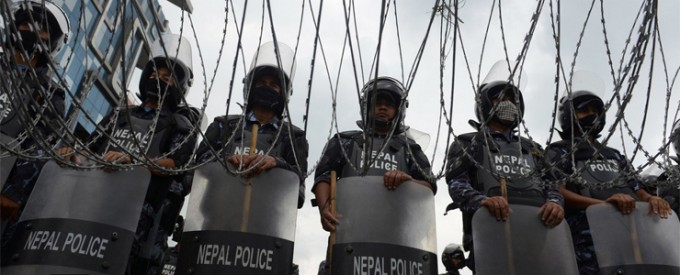네팔의 헌법 개정에 반대하는 시위대를 향해 경찰이 발포하는 사례가 잇따르면서 최소 20명이 숨진 가운데, 네팔 보안군은 시위대에 과도한 무력 사용을 자제해야 할 것이라고 국제앰네스티가 밝혔다.
격화되는 시위를 진압하기 위해 보안군이 무력을 사용하고 실탄을 발사하면서 8월부터 이미 40명 이상이 목숨을 잃었고, 사망자 대부분은 시위대였다.
네팔 국가인권위원회와 국제앰네스티를 비롯한 시민사회의 조사 결과, 사망자가 발생한 시위의 경우 대부분 보안군의 무력 사용이 과도하고 부적절하거나 불필요해, 국제법 기준을 위반하는 것으로 드러났다.
데이빗 그리피스(David Griffiths) 국제앰네스티 동남아시아 조사국장은 “최근 수 주 동안 40명이 넘는 사람이 목숨을 잃었고, 이들 대부분이 시위대였다. 국제앰네스티는 네팔 정부에 보안군을 통제하고 과도한 무력을 사용하지 못하도록 할 것을 재차 촉구한다”고 말했다.
21일 무력충돌이 발생한 태국 남부의 비랏나가르, 빌간지, 말랑와 지역은 특히 최근 긴장이 높아지고 있던 지역이다. 이들은 신규 헌법에서 남부 평원지대의 부족별 거주지역을 통합하고 새로운 주별 경계를 나눈 것에 반발하고 나섰다.
제정까지 7년 이상이 소요된 신규 헌법에서는 네팔을 7개 주로 구성된 비종교적 민주공화국으로 선포했다. 그러나 소수민족의 대표성을 반영하기에 충분하지 못하다는 주장과, 네팔을 다시 힌두교 국가로 선포해야 한다는 힌두교 활동가들의 거센 반발에 부딪혀 왔다.
데이빗 그리피스 국장은 “네팔 신규 헌법은 이외에도 시급히 다뤄져야 할 주요 인권 문제를 다수 포함하고 있다. 특히 여성과 소외계층의 권리를 명백하고 충분하게 보호하지 못하고 있다”고 말했다.
Nepal: Police restraint urged as at least 20 more shot amid Constitution-related protests
Security forces in Nepal must refrain from using excessive force against protesters, Amnesty International said after at least 20 protesters were shot when security forces opened fire on several demonstrations against the country’s new constitution.
Force and the use of live ammunition by security forces to contain often violent protests have already claimed more than 40 lives in Nepal since August, most of them protesters.
Investigations by Nepal’s National Human Rights Commission and civil society, including Amnesty International, have found that in many of the protest-related deaths, the force used by security forces was excessive, disproportionate or unnecessary, contrary to international legal standards.
“More than 40 people, the majority of them protesters, have been killed in recent weeks. We continue to urge the Nepali authorities to rein in their security forces and prevent them from using excessive force,” said David Griffiths, Research Director for South Asia at Amnesty International.
Today’s clashes took place in the southern cities of Biratnagar, Birgunj and Malangawa where tensions have been high for weeks because of controversial federal boundaries drawn up in the new constitution, which split up the homelands of ethnic groups from Nepal’s southern plains.
The constitution, which took more than seven years to complete, defines Nepal as a secular republic divided into seven federal provinces. It has been fiercely opposed by ethnic minority groups who argue that it does not afford them sufficient representation, as well as Hindu activists who believe the constitution should have restored Nepal as a Hindu nation.
“The new constitution has a number of major human rights shortcomings which also need to be urgently addressed. In particular, the rights of women and marginalized communities are not clearly and sufficiently protected,” said David Griffiths.

